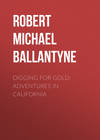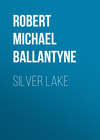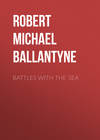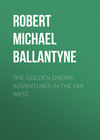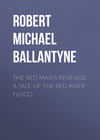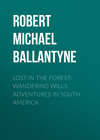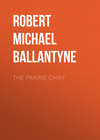Czytaj książkę: «Deep Down, a Tale of the Cornish Mines», strona 9
“Are ’ee safe, my dear man?” was John’s first question.
“Iss,” replied Maggot, shaking himself, “safe enough, an’ the daws too, but semmen to me they’ve gone dead.”
This was too true. The poor birds had perished in their captor’s bosom.
Chapter Fourteen.
Continues to treat of Spirits, and shows the Value of Hospitality
Having accomplished the feat narrated in the last chapter Maggot proceeded with his friend towards the town. On their way they had to pass the mouth of an old shaft in which both of them chanced to be much interested at that time, inasmuch as it contained the produce of a recent smuggling expedition on a large scale, consisting of nearly a hundred tubs of brandy. The liquor had been successfully brought ashore and concealed in the mine, and that night had been fixed on for its removal. Mules had been provided, and about fifty men were appointed to meet at a certain spot, at a fixed hour, to carry the whole away into the neighbouring towns.
Maggot and his comrade began to converse about the subject that was uppermost in their minds, and the former increased his pace, when John Cock drew his attention to the fact that the sun was getting low.
“The boys will be mustering now,” said John, “an’ them theere daws have kep’ us late enough already.”
“They do say that the boatsmen are informed about the toobs,” observed Maggot.
“More need to look alive,” said John.
“Hallo!” exclaimed Maggot suddenly; “there’s some wan in the shaft!”
He pointed to a neighbouring mound of rubbish, on which, just as he spoke, a man made his appearance.
Without uttering a word the smugglers sauntered towards the mound, assuming a careless air, as though they were passing that way by chance. On drawing near they recognised Ebenezer Trezise, the coastguard-man.
“Good-hevening, sur,” said Maggot; “semmen as if you’d found a keenly lode.”
“Why, iss, we’ve diskivered a noo vein,” said Trezise with a sly smile, “and we’re sinkin’ a shaft here in the hope o’ raisin’ tin, or somethin’.”
“Ha! hope you’ll let John an’ me have a pitch in the noo bal, won’t ’ee?” said Maggot with a laugh.
“Oh, cer’nly, cer’nly,” replied the boatsman; “if you’ll lend us a hand to sink the shaft. You appear to have been in the water, and ’twill warm ’ee.”
“No, thank ’ee,” replied Maggot; “I’ve bin stroobin’ a daw’s nest under cliff, an’ I fell into the say, so I’m goin’ hum to dry myself, as I’m afeared o’ kitchin’ cold, being of a delikit constitootion. But I’ll p’raps lend thee a hand afterwards.”
Maggot nodded as he spoke, and left the place at a slow saunter with his comrade, followed by the thanks and good-wishes of the boatsman, who immediately returned to the laborious task of clearing out the old shaft.
“They’ve got the scent,” said Maggot when out of earshot; “but we’ll do ’em yet. Whenever thee gets on the leeside o’ that hedge, John, do ’ee clap on all sail for Balaswidden, where the boys are waitin’, an’ tell ’em to be ready for a call. I’ll send Zackey, or wan o’ the child’n to ’ee.”
John went off on his errand the moment he was out of sight of the boatsmen, and Maggot walked smartly to his cottage.
“Owld ooman,” he said, commencing to unbutton his wet garments, “do ’ee git ready a cup o’ tay, as fast as you can, lass; we shall have company to-night.”
“Company!” exclaimed Mrs Maggot in surprise; “what sort o’ company?”
“Oh! the best, the best,” said Maggot with a laugh; “boatsmen no less—so look sharp. Zackey booy, come here.”
Zackey put down the unfortunate black kitten (which immediately sought comfort in repose) and obeyed his father’s summons, while his mother, knowing that her husband had some plot in his wise head, set about preparing a sumptuous meal, which consisted of bread and butter, tea and fried mackerel, and Cornish pasty.
“Zackey, my son,” said Maggot while he continued his toilet.
“Iss, father.”
“I want ’ee to come down to the owld shaft with me, an’ when I give ’ee the ward cut away as hard as thee legs can spank to Balaswidden, an’ fetch the lads that are theere to the owld shaft. They knaw what to do, but tell ’em to make so little noise as they can. Dost a hear, my son?”
“Iss, faither,” replied Zackey, with a wink of such profound meaning that his sire felt quite satisfied he was equal to the duty assigned him.
“Now, doan’t ’ee wag tongue more than enough,” continued Maggot; “and go play with the chet till I’m ready.”
The urchin at once descended like a thunderbolt on the black kitten, but that marvellous animal had succeeded in snatching five minutes’ repose, which seemed to be amply sufficient to recruit its energies, for it began instantly to play—in other words to worry and scratch the boy’s hand—with the utmost glee and good-humour.
In a few minutes Maggot and his son went out and hastened to the old shaft, where they found the boatsmen still hard at work with pick and shovel clearing away the rubbish.
“You haven’t found a bunch o’ copper yet, I dessay?” said Maggot with a grin.
“No, not yet, but we shan’t be long,” replied Eben Trezise with a knowing smile.
“It’s warm work,” observed Maggot, as he looked down the hole, and saw that what the boatsman said was true, and that they would not be long of reaching the spot where the liquor had been concealed.
Trezise admitted that it was warm work, and paused to wipe his heated brow.
“I wish we had a drop o’ water here,” he said, looking up.
“Ha!” exclaimed Maggot; “not much chance o’ findin’ water in that hole, I do think—no, nor brandy nuther.”
“Not so sure o’ that,” said Trezise, resuming his work.
“Now, et is a shame to let ’ee die here for want of a drop o’ water,” said Maggot in a compassionate tone; “I’ll send my booy hum for some.”
The boatsmen thanked him, and Zackey was ordered off to fetch a jug of water; but his father’s voice arrested him before he had gone a hundred yards.
“Hold on a bit, my son.—P’raps,” he said, turning to Trezise, “you’d come up hum with me and have a dish o’ tay? Missus have got it all ready.”
The invitation appeared to gratify the boatsmen, who smiled and winked at each other, as though they thought themselves very clever fellows to have discovered the whereabouts of a hidden treasure, and to be refreshed in the midst of their toil by one whom they knew to be a noted smuggler, and whom they strongly suspected of being concerned in the job they were at that time endeavouring to frustrate. Throwing down their tools they laughingly accepted the invitation, and clambered out of the shaft.
“Now’s your time,” whispered Maggot with a nod to his hopeful son, and then added aloud—
“Cut away, Zackey booy, an’ tell mother to get the tay ready. Run, my son, let us knaw what thee legs are made of.”
“He’s a smart lad,” observed Trezise, as Zackey gave his father an intelligent look, and dashed away at the top of his speed.
“Iss, a clever cheeld,” assented Maggot.
“Bin down in the mines, I dessay?” said Trezise.
“Iss, oh iss; he do knaw tin,” replied Maggot with much gravity.
In a few minutes the two coastguard-men were seated at Mrs Maggot’s well-supplied board, enjoying the most comfortable meal they had eaten for many a day. It was seasoned, too, with such racy talk, abounding in anecdote, from Maggot, and such importunate hospitality on the part of his better half, that the men felt no disposition to cut it short. Little Grace, too, was charmingly attentive, for she, poor child, being utterly ignorant of the double parts which her parents were playing, rejoiced, in the native kindliness of her heart, to see them all so happy. Even the “chet” seemed to enter into the spirit of what was going on, for, regardless of the splendid opportunity that now presented itself of obtaining repose to its heart’s content, that black ball of concentrated essence of mischief dashed wildly about the floor and up the bed-curtains, with its back up and its tail thickened, and its green eyes glaring defiance at everything animate, inanimate, or otherwise, insomuch that Maggot made sundry efforts to quell it with the three-legged stool—and Mrs Maggot followed suit with a dish-clout—but in vain!
Meanwhile, men and mules and horses were converging by many paths and lanes towards the old shaft, and the shaft itself was apparently endued with the properties of a volcano, for out of its mouth issued a continuous shower of dust and stones, while many stalwart arms laid bare the mine beneath, and tossed up the precious “tubs” of brandy.
Before the pleasant little tea-party in Maggot’s cottage broke up the whole were scattered abroad, and men and mules and horses sped with their ill-gotten gains across the furze-clad moors.
“Sure it’s early to break up,” said Maggot, when the boatsmen at last rose to take their leave; “there’s no fear o’ the bunches o’ copper melting down there, or flyin’ away.”
“There’s no saying,” replied Eben Trezise; “you’ve heerd as well as we of lodes takin’ the bit in their teeth an’ disappearing—eh?”
“Well, iss, so they do sometimes; I’ll not keep ’ee longer; good-hevenin’ to ’ee,” said Maggot, going outside the door and wishing them all manner of success as they returned to the old shaft.
Reader, shall we follow the two knowing fellows to that shaft? Shall we mark the bewildered expression of amazement with which they gazed into it, and listen to the wild fiendish laugh of mingled amusement and wrath that bursts from them in fitful explosions as the truth flashes into their unwilling minds? No; vice had triumphed over virtue, and we deem it a kindness to your sensitive nature to draw a veil over the scene of her discomfiture.
Chapter Fifteen.
Introduces a Stranger, describes a Picnic, and reveals some Secrets of Mining
Somewhere in the vicinity of that magnificent piece of coast scenery in West Cornwall, known by the name of Gurnard’s Head, there sauntered, one fine afternoon, a gentleman of tall, commanding aspect. All the parts of this gentleman were, if we may so speak, prononcé. Everything about him savoured of the superlative degree. His head and face were handsome and large, but their size was not apparent because of the capacity of his broad shoulders and wide chest. His waist was slender, hair curly and very black, only to be excelled by the intense blackness of his eyes. His nose was prominent; mouth large and well shaped; forehead high and broad; whiskers enormous; and nostrils so large as to appear dilated. He was a bony man, a powerful man—also tall and straight, and a little beyond forty. He was to all appearance a hero of romance, and his mind seemed to be filled with romantic thoughts, for he smiled frequently as he gazed around him from the top of the cliffs on the beautiful landscape which lay spread out at his feet.
Above him there were wild undulating slopes covered with rich green gorse; below were the cliffs of Gurnard’s Cove, with rocky projections that resemble the castellated work of man’s hand, and intermingled therewith much of the matériel connected with the pilchard fishery, with masses of masonry so heavy and picturesque as to resemble Nature’s handiwork. Beyond lay the blue waters of the Atlantic, which at that time were calm almost as a mill-pond, studded with a hundred sails, and glittering in sunshine.
The spot appeared a beautiful solitude, for no living thing was visible save the romantic gentleman and a few seagulls and sheep. The pilchard fishery had not yet commenced, and the three or four fishermen who pitched and repaired their boats on the one little spot of sand that could be seen far below on that rugged coast appeared like mice, and were too far distant to break the feeling of solitude—a feeling which was not a little enhanced by the appearance, on a spot not far distant, of the ruined engine-house of a deserted mine.
It was indeed a lovely afternoon, and a beautiful scene—a very misanthrope would have gazed on it with an approach at least to benignity. No wonder that George Augustus Clearemout smiled on it so joyously, and whisked his walking-cane vigorously in the exuberance of his delight.
But, strange to say, his smile was always brightest, and the cane flourished most energetically, when he turned his eyes on the ruined mine! He even laughed once or twice, and muttered to himself as he looked at the picturesque object; yet there seemed nothing in its appearance calculated to produce laughter. On the contrary, there were those alive whom the sight of it might have reduced to tears, for, in its brief existence, it had raised uncommonly little tin or copper, although it had succeeded in sinking an immense amount of gold! Nevertheless Mr Clearemout chuckled every time he looked at the ruin, and appeared very much tickled with the thoughts to which it gave rise.
“Yes! the very thing! capital!” he muttered to himself, turning again and again to the object of his admiration, “couldn’t be better—ha! ha! most suitable; yes, it will do for ’em, probably it will do ’em—do ’em,” (he repeated the phrase two or three times with a greater display of white teeth at each utterance of it), “a most superb name—Wheal Do-em—ha! ha! Spell it with two o’s to make it look more natural, and ensure correct pronunciation—Wheal Dooem—nothing could be finer, quite candid and above-board—no one can call it a swindle.”
This last idea caused Mr Clearemout to break into the loudest laugh in which he had hitherto indulged, and he was about to repeat it, when the appearance of a phaeton at a turn of the carriage road reduced him to gravity.
The vehicle contained a party of ladies and gentlemen from St. Just, among whom were Rose Ellis, Mrs Donnithorne and her husband, Oliver Trembath, and Mr William Grenfell, a gentleman of property in the neighbourhood.
As it approached the spot where Mr Clearemout stood, the horse swerved at a sheep which started out from behind a furze bush, and then backed so rapidly that the hind-wheels were on the point of passing over the edge of the road, when the tall stranger sprang to its head, and led it gently forward.
The danger was not great, for the road at the place was elevated little above the sward, but it was sufficiently so to warrant a profusion of thanks from the occupants of the vehicle, and a pressing invitation to Mr Clearemout to join the picnic party then and there assembling.
“You see, we’re not all here,” said Mr Donnithorne, bustling about energetically, as he pulled baskets and bottles from the body of the vehicle, while Oliver assisted the ladies to alight; “there’s another machineful coming, but we have lots of grub for all, and will only be too glad of your company, Mr—Mr—what did you say?”
“Clearemout,” interposed that gentleman, with a bow and a bland smile that quite took Mr Donnithorne by storm.
“Ah, yes, glad to have you, Mr Clearemout; why, our necks might all have been broken but for you. Rose, my dear, do look after this basket. There—thanks—how hot it is, to be sure! Mr Clearemout—Mr Grenfell; no introduction—only to let you know his name—my wife—niece, Rose—Oliver Trembath, and all the rest; there, dispense with ceremony on a picnic always. That’s the chief fun of it.”
While the lively old gentleman ran on thus, and collected the baskets together, Mr Grenfell, who was a tall, gentlemanly man of about sixty, with a grave, aristocratic countenance and polite manner, assured Mr Clearemout that he was happy to make the acquaintance of a man who had rendered them such opportune service, whereupon Mr Clearemout declared himself to be fortunate in being present at such a juncture, and protested that his service was a trifle in itself, although it had led to an introduction which was most gratifying. Then, turning with much urbanity of manner to the ladies, he entered into conversation with them.
“Here they come!” shouted old Mr Donnithorne, as another carriage drove up.
“The rest of our party,” said Mr Grenfell, turning to Mr Clearemout; “friends from St. Just.”
The carriage stopped as he spoke, and a number of ladies and gentlemen descended therefrom, and mingled their congratulations at the narrow escape which had just been made, with thanks to the dark stranger, and with orders, questions, counter-orders, and explanations innumerable, about baskets to be carried and places to be selected.
The picnic, we need scarcely say, very much resembled picnics in general. All were in good spirits—elated with the splendour of the day, the beauty of the views, and the freshness of the sea-breeze that sprang up soon after their arrival. The only one whose feelings were not absolutely unruffled was Oliver Trembath. That youth was afflicted with an unaccountable dislike to the dark stranger which rendered him somewhat uncomfortable. As for the stranger, he made himself extremely agreeable—told anecdotes, sang songs, and became an immaculate waiter on the whole company, handing about plates, glasses, knives, etcetera, etcetera, as deftly as if he were dealing a pack of cards. Above all, he was a good listener, and not only heard other people’s stories out to the end, but commented on them as one who had been interested. With all this, he was particularly attentive to Rose Ellis, but so guarded was he that no one noticed the attentions as being peculiar except Rose herself, and Oliver Trembath, who, for the first time in his life, to his great surprise and displeasure, felt the demon of jealousy tormenting his breast.
But in the midst of all this, Mr George Augustus Clearemout displayed an insatiable curiosity in regard to mines and miners. Whatever might be the subject of conversation for the time, he invariably took the first opportunity of returning to his favourite theme with one or another of the party, as occasion served.
Ashamed of the feelings which troubled him, Oliver Trembath resolved to take the bold and manly step of stifling them, by making himself agreeable to the object of his dislike. Accordingly, he availed himself of an opportunity when the party broke up into groups to saunter about the cliffs, and entered into converse with the stranger on the subject of mines.
“You appear to take much interest in mining, I think,” said he, as they walked out on the promontory together.
“I do indeed,” replied Clearemout; “the mines of Cornwall have ever been a subject of deep interest to me, and the miners I regard as a race of men singularly endowed with courage and perseverance.”
“Your opinion of them is correct,” said Oliver. “Have you ever seen them at work?”
“No, I have only just arrived in the county, but I hope to visit the mines ere long.”
“When you do,” said Oliver with enthusiasm, “your opinion of them will be strengthened, for their endurance underground, and their perseverance in a species of labour which taxes their muscular power as well as their patience to the uttermost, surpasses anything I have either seen or heard of. England does not fully appreciate, because she is not minutely acquainted with, the endurance and courage of her Cornish miners. The rocks through which they have to cut are so hard and unyielding that men who had not been trained from childhood to subdue them would lose heart altogether at the weight of toil and the small return for it. Sometimes, indeed, miners are fortunate, and here, as elsewhere, lucky hits are made, but for the most part their gains are barely sufficient for their wants; and whether they are lucky or unlucky in that respect, the toil is always hard—so hard that few of them retain health or strength sufficient to go underground beyond the age of forty-five, while hundreds of them find an early grave, owing to disease resulting from their peculiar work, or to accidents. These last are usually occasioned by the bursting out of collections of water which flood the mines, or the fall of masses of timber, or the premature explosion of blast-holes. At other times the men lose hold of the ladders—‘fall away’ from them, as they express it—or stumble into a winze, which is a small shaft connecting level with level, in which latter case death is almost certain to ensue, many of the winzes being sixty feet deep. In St. Just you will see many poor fellows who have been blinded or maimed in the mines. Nevertheless Cornish miners are a contented, uncomplaining race of men, and Cornwall is justly proud of them.”
“I am much interested in what you tell me,” said Clearemout; “in fact I have come here for the purpose of making inquiry into mines and mining concerns.”
“Then you will find this to be the very place for you,” said Oliver. “My uncle, Mr Donnithorne, and Mr Grenfell, and Mr Cornish are intimately acquainted with mining in all its phases, and will, I am certain, be happy to give you all the information in their power. As to the people of St. Just and its neighbourhood, you will find them most agreeable and hospitable. I can speak from personal experience, although I have only been a short time among them.”
“I doubt it not,” replied Mr Clearemout with a bland smile; “my own limited experience goes far to corroborate what you say, and I hope to have the pleasure of still further testing the truth of your observations.”
And Mr George Augustus Clearemout did test their truth for several weeks after the picnic. He was received with kindness and hospitality everywhere; he was taken down into the mines by obliging agents, and was invited to several of the periodical business dinners, called “account-dinners,” at which he met shareholders in the mines, and had an opportunity of conversing with men of note and wealth from various parts of the county. He dwelt, during his stay, with old Mr Donnithorne, and, much to the surprise if not pleasure of Rose, proved himself to be a proficient on the guitar and a good musician.
At length the dark gentleman took his departure for London, whither we shall follow him, and watch his proceedings for a very short time, before returning to the principal scene of our tale.
Almost immediately on his arrival in the great city, he betook himself to the West End, and there, in a fashionable square, solicited an interview with an old lady, whose principal noteworthy points were that she had much gold and not much brains. She was a confiding old lady, and had, on a previous occasion, been quite won by the insinuating address of the “charming Mr Clearemout,” who had been introduced to her by a noble lord.
To this confiding old lady George Augustus painted Cornish mines and mining in the most glowing colours, and recommended her to invest in a mine a portion of her surplus funds. The confiding old lady had no taste for speculation, and was rather partial to the three per cent consols, but George Augustus was so charmingly persuasive that she could not help giving in—so George proposed little plans, and opened up little prospects, and the confiding old lady agreed to all the little plans without paying much regard to the little prospects.
After this Mr Clearemout paid another visit in another West End square—this time to a gentleman. The gentleman was young and noble, for Clearemout styled him “My lord.” Strange to say he also was of a confiding nature—very much so indeed—and appeared to be even more completely under the influence of George Augustus than the confiding old lady herself.
For the benefit of this young gentleman Mr Clearemout painted the same picture in the same glowing colours, which colours seemed to grow warmer as the sun of success rose upon it. He added something about the value of a name, and referred to money as being a matter of small consequence in comparison. The young lord, like the old lady, agreed to everything that was proposed to him, except the proposal to advance money. On that point he was resolute, but Clearemout did not care much about obtaining money from the confiding young gentleman. His name was as good as gold, and would enable him to screw money out of others.
After this the dark man paid a visit to several other friends at the West End, all of whom were more or less confiding—some with selfish, others with unselfish, dispositions—but all, without exception, a little weak intellectually. These had the same glowing pictures of a Cornish mine laid before them, and most of them swallowed the bait whole, only one or two being content to nibble.
When afternoon began to merge into evening Mr Clearemout paid a last visit for the day—but not in the West End, rather nearer to the City—to a gentleman somewhat like himself, though less prepossessing, for whose benefit he painted no glowing picture of a mine, but to whom he said, “Come, Jack, I’ve made a pretty good job of it; let’s go and have a chop. If your luck has equalled mine the thing is done, and Wheal Dooem, as I have named the sweet little thing, will be going full swing in a couple of weeks—costing, perhaps, a few hundreds to put it in working order, with a trifle thereafter in the shape of wages to a man and a boy to coal the fire, and keep the thing moving with as much noise as possible to make a show, and leaving a pretty little balance of some twenty or thirty thousand at the credit of the Company, for you and me to enjoy in the meantime—minus a small sum for rent of office, clerk’s salary, gas and coal, etcetera, as long as the bubble lasts.”
Thus did this polite scoundrel go about from house to house getting up a Cornish Mining Company on false pretences (as other polite scoundrels have done before, and doubtless as others will do again), bringing into unmerited disrepute those genuine and grand old mines of Cornwall which have yielded stores of tin and copper, to the enriching of the English nation, ever since those old-world days when the Phoenicians sailed their adventurous barks to the “Cassiterides” in quest of tin.
While these things were being done in London, a terrible catastrophe happened in Botallack mine, which threw a dark cloud for some time over more than one lowly cottage in St. Just.














